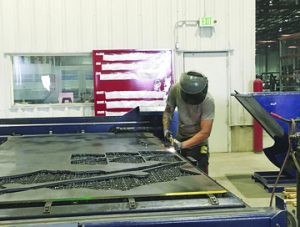Spudnik Equipment Co., a German-owned company in Blackfoot, recently partnered with Idaho State University Continuing Education and Workforce Training to create a registered apprenticeship program. Photo courtesy of Spudnik Equipment Co.
By Stephanie Bachman
Idaho State University
Do you remember reading fifth-grade history books about journeymen and apprentices? Remember learning that apprentices trained with blacksmiths or seamstresses or tailors, those age-old crafts that have advanced and aren’t as popular nowadays thanks to modern-day robots and machines?
You may be surprised that apprenticeships are still quite popular today—especially in Europe, and more specifically, Germany. Yet you may be even more surprised to find out that a custom-registered apprenticeship program has been created just 30 minutes away from Pocatello in Blackfoot.
Spudnik Equipment Co., a German-owned company, recently partnered with Idaho State University’s Continuing Education and Workforce Training to create a registered apprenticeship program and hired Blackfoot youths who are fresh out of high school. Spudnik is a pioneer in bringing registered apprenticeships to the region and the benefits these apprenticeships could bring to Southeastern Idaho are many.
Apprenticeships provide a unique learning experience as the apprentices do on-the-job training and take classes tailored to help them learn about the trade. So rather than have a machinist analyze “Romeo and Juliet” in an English class, they instead learn technical writing and reading skills to help them in their vocational area. Trainees are also paid for all the training they go through, and their pay increases as they learn new skills and become more of an asset to the company.
After seeing the low unemployment rates in Europe and learning that these programs help combat college debt, the U.S. has been interested in creating apprenticeship programs in the country. In the past few years, then-President Obama and now-President Trump have both advocated for apprenticeships, and Trump even more than doubled the federal funding from $90 million to $190 million.
Some of the voices of concern worry that apprenticeships will lead to assigning youth to a vocation for life, with little wiggle room should they decide they don’t want to stay in that career. Yet trainees can switch over and change programs if this happens.
Spudnik also helps combat this issue by training their apprentices in different areas such as welding, assembling, painting, and more. This way trainees can see what area they enjoy the most, so they don’t feel confined to just one vocation.
If businesses around the area follow Spudnik’s example and introduce apprenticeships to youths, it will provide an alternative to traditional colleges. This could lessen college debt, provide youths nearby with experience and careers, and lower unemployment rates.
It is also worth mentioning that while most apprenticeships in America focus on construction trades, nearly 60 percent of apprenticeships in Germany have more of a diverse range in jobs. From banking to doctor’s assistant to manufacturing to IT, apprenticeships can be expanded to include not only “blue-collar” work, but many more career fields as well.
With Spudnik’s introduction of registered apprenticeships in the area, apprenticeships have the potential to catch spark among other businesses. This in turn could provide more options to those who don’t feel college is for them or who would like to have a shot at being an apprentice in a career they may be interested in.
Anyone interested in developing an apprenticeship program within a company, can contact Paul Dickey of ISU Continuing Education and Workforce Training at pdickey@isu.edu.





